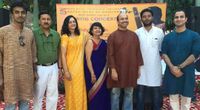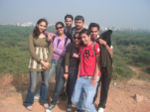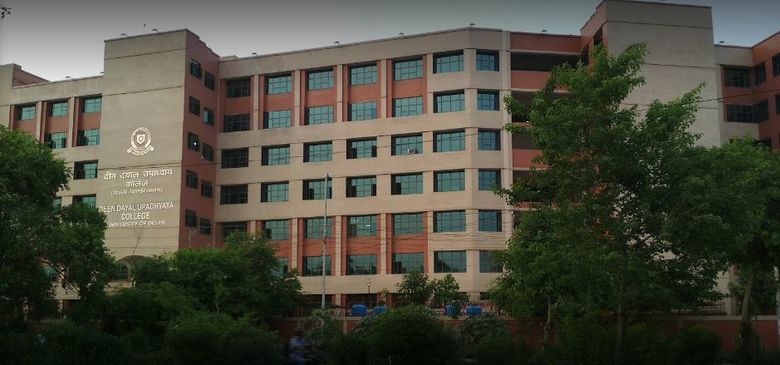User:English Honours DDUC
Date & Time : 21, December 2024 16:12
| | |||
| Employer: | Deen Dayal Upadhyaya College University of Delhi [http://dducollege.du.ac.in | ||
| Nationality: | Indian | ||
| |||
Contents
Our Course
A common myth associated with English (Hons.) is that it enables you to learn "English." An assumption is that this course facilitates the student to use, i.e. speak and read, the language "fluently." Another fallacy is that this is an easy course, requiring little mental rigour, meant only for girls from rich households.
(SIGH!!)... The reality is far from this. If you want to do English (Hons.) a prior knowledge of the language is a prerequisite. Also, it is NOT an easy course: you have to finish more than 60 texts in the span of three years. Apart from this primary reading you have to do a lot of secondary reading as well. In short, if you are doing English (Hons.) you don’t have time for any other part time course, and if you are planning to pursue such a course … you are in BIG TIME TROUBLE!!!.
Now what is English (Hons.) really about???
This course is an eye-opener and will radically change your perception towards social issues and society. It sensitises you to the concerns of the day and presents different facets of these burning issues. This wholistic approach empowers you in the search for options and approaches to resolve the same.
During the three years of the course every text is analysed INSIDE OUT. You are taught to place the text in its contemporary historical milieu and then assess it. The text is then transposed into the current scenario and judged for its historical and current value and relevance. A psychological study of characters, their behaviour, actions and motives for the same is also undertaken. This in turn enhances your understanding of human behaviour. In a nutshell the course teaches you to think critically and form informed, unbiased opinions.
|
Our Result
Our College
Deen Dayal Upadhyaya College, Delhi University was inaugurated on August 20, 1990. Pt. Deen Dayal Upadhyaya was a scholar, an educationist, and a freedom fighter.
Since its inception, the college has striven to earn excellence in its academic endeavours by constantly incorporating innovative trends in teaching. Through relentless labour and hardwork, our competent faculty ensures our success in academics; it also ensures our well-rounded development through participation in sports and extra curricular activities like debates, dramatics, music, social service and the activities of various subject societies.
Currently the college has a strength of more than 2500 students and imparts knowledge on various disciplines of Humanities, Science and Commerce.
Our vision is to be an Academia of "first choice" and to transform lives that will change the world for the better.
Our Principal
Dr.Hem Chand Jain, our Principal, is a dynamic leader who believes in the all-round development of students. Incidentally, he is one of the youngest Principal in Delhi University. He believes that "all study and no play makes Jack a dull boy." While on the one hand he guides the students towards excellence in academics, on the other he encourages them to participate in extra-curricular activities.
A man of Commerce he is the de-facto Chief Patron of the Department Of English. He has always been a pillar of strength and an inspiration for all of us.
IN THE NEWS
ZEST LECTURE SERIES 2021,POST-PANDEMIC WORLD: FROM PANDEMONIUM TO PARADISE?
Our Faculty
- Dr. Pramesh Ratnakar Dr.Pramesh Ratnakar
- Dr. Anubha Mukherji Sen Dr.Anubha Mukherji Sen
- Dr. Jayini Adhyapak
- Dr. Rohith P (HOD) Dr Rohith P
- Dr. Lalit Kumar
- Mr. Nitin Luthra (On leave)
- Mr. Ranbeer Kumar
- Dr Pooja Bhardwaj Sharma
- Dr Ankita Pandey
- Ms Mishail Sharma
- Mr Chandrashekhar Yadav
English Society - ZEST
There are innumerable definitions for ZEST. We have tried to redefine in it our own special way.
ZEST, for us, embodies the principals of academics, scholarship and brilliance. The guiding principles exemplified through our society are:
- Z in ZEST is inspired from the Greek word Zelos. It reflects the spirit and fervour for a cause and interprets the whole idea of being virtuous, everything that supports endures and exhalts life.
- E in ZEST comes from the Latin word Enuntiatus; it emblematizes expression and its various modes viz.innovation and pathbreaking.
- S in ZEST comes from the Greek word Sunergos, it epitomises the ideal of togetherness and unity and negates the concept of us vs. them. It appeals for alliance and aims for cohesion.
- Last but not the least T in ZEST comes from the Latin word Tribunus. It is the reminder of being the pioneers in the sphere of knowledge. It is symbolic of the whole system of higher education in which we participate not only to earn livelihood but to carve out a living.
- 'Zest' is what we believe in and what we practice. Our educational holistic approach is evident in the symbolic peripheral circle. A scholar with a tilted hat, represents the unquenchable thirst for the academic excellence. A dancing 'z' is inscribed at the centre to further visualize the spirit of zeal and enthusiasm. We constantly try our best to strive towards perfection.
Office bearers for English Society for the session 2021/22
Click here for Office bearers of previous years
Committees and Members(2021-2022)
ZEST Reports (2007-2015)
ZEST Reports(2021-2022)
The ZEST Spectator
The WikiEducator Team
•Vishal Kumar
•Sejal Dutta
•Astha Sinha
•Vanshika Mishra
- SOCIETY LOGO DESIGNED BY Aarushi Sharma
- SOCIETY NAME CONTRIBUTED BY Vikash Shukla
POST SCRIPT To know about courses for various years, please click on the links given above for various years.
Some useful Wikieducator resources
•Our Social Media Handles:-
YouTube
Instagram
Facebook
LinkedIn Account
LinkedIn Page




